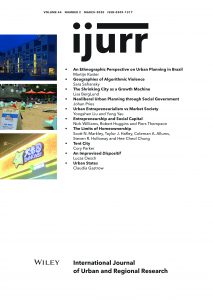While state institutions are involved in planning and governance in African cities, their relevance in shaping urban life is sometimes questioned given what residents often experience as the extreme incapacity of state agencies. In response, some scholars have sought to rethink the nature of institutions, while others have shifted their attention to the role of the everyday in the making of cities. This article builds on literature that seeks to better understand the links between quotidian actions and institutional constraints, in order to critically assess how state power is exercised in African cities. It does this by tracking the Presidency’s role in shaping Angola’s capital, Luanda, in the 1990s and 2000s. The Presidency consolidated power through the urban landscape even in moments when it seemed state presence had totally collapsed. The article therefore shows that a more nuanced understanding of the logics of power in African cities can reveal the ongoing significance of state institutions to their making, even in contexts where the everyday experience of state capacity is one of absence or negligence.

